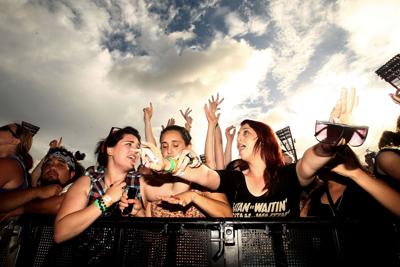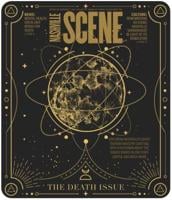Vodka Yonic features a rotating cast of women, nonbinary and gender-diverse writers from around the world sharing stories that are alternately humorous, sobering, intellectual, erotic, religious or painfully personal. You never know what you’ll find in this column, but we hope this potent mix of stories encourages conversation.
I thought emo was for millennials nostalgic for a youth spent stuck in their hometown while they longed for “more.” I was wrong. I came around to the genre much later in life.
I was born and raised in South Texas, and was the first girl in a mixed-race family. I am the product of an Mexican immigrant father and a tomboy mom whose combined musical knowledge was informed by whatever played on the radio — either classic rock or ’90s country. I went to Catholic school and sang in the church choir, and my aspiration was to be a cookie-cutter, academically sound, God-loving daughter.
In seventh grade, my classmates began breaking the dress code — they were getting written up, and they looked cool while they did it. I tried to follow suit, but my awkward attempts at hiking up my skirt under a large school-approved sweater looked juvenile. I feared a write-up, or worse — a call to my parents. While my friends wore hoodies with bright images and words like “Pierce the Veil,” “Motionless in White” and “My Chemical Romance,” I would hear the screaming coming through dirty shared headphones and wonder why anyone would willingly listen to that.
The first time I engaged with any “heavier” music was when my friends showed me My Chemical Romance’s video for “I’m Not Okay (I Promise).” Amid their gasps — “How have you not seen this?” and “Oh, you have definitely heard this!” — I replied “Maybe?” But the truth was I hadn’t.
It wasn’t until autumn 2021 that I added the 2002 MCR album I Brought You My Bullets, You Brought Me Your Love to my music library. A song called “Drowning Lessons” was suggested by Spotify radio, and I needed to hear more. This would be the first time I truly listened to MCR. I was working in the emergency room and critical care units in a world navigating a global pandemic. As a 21-year-old, I paid rent, sat in lines of impatient commuters, prepared meals and accepted my place as a member of the working-class monotony.
I learned that the album accompanying me through my disenchantment was written by people who were my age when it was released. A 20-something Gerard Way saw a plane hit the Twin Towers on the way to his unpaid internship. That night, he wrote “Skylines and Turnstiles” — the first My Chemical Romance song. It begins with the words “You’re not in this alone.” This line was befitting of the journey through the discography ahead. It was also something I needed to hear. I felt socially isolated and useless, witnessing so much beyond my control. The world felt so large and unnavigable, but maybe if confused 20-somethings of the past have made it through, I could too.
Within a few months of hearing that album and committing the band’s entire discography to memory, I booked an appointment to get my then-virgin hair dyed a vibrant red, á la Way in 2010. Then came a walk-in tattoo of a scorpion, because I saw a video of guitarist Frank Iero explaining that he had gotten one on his neck in the late ’90s. Back then, something like that might render a person unhirable, and it was his way of declaring his choice to be an artist. When my family asks, I just say it’s my astrological sign. Around the same time, my clothing started to shift from oversized florals to fishnets, combat boots and dark shirts I’d buy at concerts — regardless of whether or not I liked the band.
The theatrical pop-punks’ reunion road show also brought Dilly Dally and Turnstile back to Music City
When MCR’s reunion tour came through Nashville, I missed it so I could see a different seventh-grade-hoodie regular, Motionless in White. I vowed then and there that I would see MCR while crowded against the barricade, screaming out every ounce of the 20-something angst I felt.
That day came this summer. I made the pilgrimage of every 2000s tween’s dream: a road trip to Forks, Wash., best known as the setting for Twilight. Then I went to downtown Seattle to see My Chemical Romance on the first night of their sold-out Black Parade Tour. I cried with my friends singing the melancholy words, “You’re just a sad song with nothing to say.” My tears did not cease during the inspiring songs as I proclaimed that I am “Not afraid to keep on living / To walk this world alone.”
Maybe it’s my Catholic upbringing, my anxiety or the phase I had when I was 19, but I believe everything has found me when the timing was right. This includes being able to experiment with my interest and appearance at my age. In fact, I believe more 20-somethings should scream, should be provocative, should change their appearance and change it again.
Mundanity will always be there. In the words of My Chemical Romance: “Fake your death.” Give yourself permission to be whoever you want to be.






